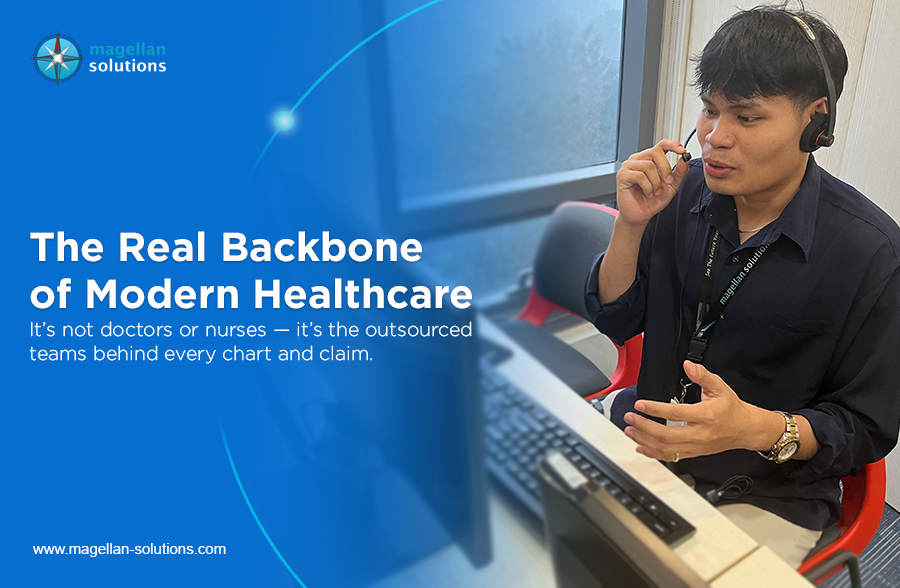Schedule a FREE call with our outsourcing expert now and get a precise quotation that meets your requirements. Don't wait - get started today!
The Shift to Virtual Medical Offices
A virtual medical office allows healthcare providers to deliver care remotely through secure digital platforms. Patients can connect with their doctors without the need for physical visits. Healthcare teams can access medical records, manage appointments, and even prescribe treatments from anywhere.
This shift is not only about convenience for patients but also about improving efficiency for healthcare professionals. Through virtual medical offices, doctors can have more control over their schedules and serve a broader range of patients. However, it’s important to understand how this affects medical office management.
Key elements of a virtual medical office include:
- Virtual care: The ability to deliver medical consultations and care without a physical presence.
- Medical records management: Secure storage and access to patient medical histories.
- HIPAA-compliant systems: Ensuring privacy and security in handling sensitive information.
Benefits for Healthcare Providers: Streamlining Operations
Implementing a virtual medical office can streamline many aspects of healthcare management. For SMEs, this could mean less overhead costs, fewer administrative tasks, and the ability to reach more patients without needing a large physical infrastructure.
Benefits include:
- Remote patient management: Providers can monitor patients without needing to be in the same room.
- Access to medical records from anywhere: Whether you’re at home or in a different location, accessing medical data is easy and secure.
- Increased patient satisfaction: Patients appreciate the flexibility of virtual care and the ability to access medical services without needing to travel.
Key Features of a Virtual Medical Office
Running a virtual medical office involves much more than just setting up a video call. Here are some key features that make it effective for healthcare providers and their patients.
1. Secure Medical Records Management
Managing medical records digitally is one of the core benefits of a virtual medical office. With the right system in place, healthcare providers can maintain HIPAA-compliant medical records. This ensures patient data remains secure while still being accessible to the right people when needed.
- Cloud storage: Enables easy access to patient records from anywhere.
- Security measures: Encryption and other security tools protect sensitive medical data.
2. HIPAA-Compliant Virtual Care Systems
HIPAA compliance is essential for virtual medical offices. Any platform used for patient care and communication must comply with privacy regulations to avoid penalties and ensure patient information remains confidential.
- Secure communication channels: Ensuring virtual consultations are private and protected from breaches.
- Privacy settings for records: Only authorized personnel can access sensitive information.
3. Appointments and Scheduling Software
Scheduling systems are often integrated into virtual medical offices. These systems allow patients to book appointments online, and providers can easily manage their schedules. With cloud-based systems, real-time updates ensure that appointments are never double-booked.
- 24/7 booking: Patients can schedule appointments at any time, increasing convenience.
- Automated reminders: Patients get reminders before their appointments, reducing no-shows.
Overcoming Challenges in Virtual Medical Office Implementation
While the benefits are clear, there are challenges to setting up a virtual medical office. Here’s what you need to know:
1. Technical Infrastructure
A virtual medical office requires a robust technical setup. This includes secure communication tools, patient management software, and systems to handle medical records. Choosing the right technology can be daunting, especially for small healthcare providers who may not have the resources to build a complex system from scratch.
Solution: Many companies, like Magellan Solutions, provide tailored solutions to help healthcare providers set up secure, HIPAA-compliant virtual care systems.
2. Training for Healthcare Professionals
Healthcare providers must be familiar with new digital tools to make the transition to a virtual office seamless. They need to be trained in using video consultations, managing digital records, and ensuring patient privacy.
Solution: Virtual training programs and ongoing support are essential to ensure everyone on the team is comfortable with the new system.
3. Patient Adoption
Some patients, especially those not tech-savvy, may find it challenging to adapt to virtual care. Providers must offer easy-to-use platforms and educate their patients on accessing services online.
Solution: Clear instructions and customer support can help patients feel more confident when using virtual care tools.
The Future of Virtual Medical Offices
The virtual medical office is likely to become even more integrated into everyday healthcare. The technology is improving, and more people are becoming comfortable with online healthcare services. The trend towards remote healthcare is expected to grow, especially as patients demand more convenience.
Here’s a statistic to consider: A recent study found that 60% of patients are open to having their next doctor’s visit conducted virtually. This shows that the demand for virtual medical services is rising.
As more healthcare providers adopt virtual medical offices, we can expect smoother operations, improved patient care, and increased access to healthcare services.
Empower Your Healthcare Operations Today
Your healthcare practice can benefit from a virtual medical office. By incorporating digital systems into your operations, you can streamline services, improve patient satisfaction, and ensure that your practice remains secure and efficient.
Book your FREE 60-minute business consultation today! Let’s strategize how we can elevate your operations with the right tools and services. No commitments, just results-driven insights. At Magellan Solutions, we offer tailored solutions for SMEs in healthcare. Our expertise in HIPAA-compliant virtual care systems, secure medical records management, and remote patient solutions will help your practice thrive in the digital age. Take the first step toward a more efficient, modern healthcare system for your business today!
















